So The Jews Went From Being Victims Of Genocide To Commiters Of It? Weird How The Circle Of Power Goes.
So the Jews went from being victims of genocide to commiters of it? Weird how the circle of power goes.
okay no, this is not the way it is. jewish people =/= israel. not all jewish people condone israel’s actions, and a significant number actively oppose it.
and jewish people continue to face antisemitism today, so saying something like “Jewish people went from victims to committers” as a general statement is really gross.
(also a lot of jewish people have expressed discomfort with the word “Jews” and prefer “Jewish” btw)
More Posts from Rosehen96 and Others










People like to pretend I will "get better" so they do not have to think about the deadly lie they are living. Abandoning disabled and high-risk people to preventable death is eugenics.
To clarify, this is NOT just an American issue -- think of the "pan" in pandemic.
The MSKCC Library
The People's CDC (weekly weather reports on COVID in the U.S.)
Image IDs available in Alt Text and written out below:
Image ID begins. A black and white cartoon comic titled Pandemic Year 4. This is panel 1. A boy with short hair — Joey, the author of the comic — is holding a Christmas wreath and handing it to his boyfriend, a boy with long hair and a beard, who is standing in a window while decorating. The text reads: This year, my boyfriend and I got fresh pine wreaths from the farmer’s market — our fist big Christmas decorations together!
Panel 2. A hand holds pine needles. Cartoon stink clouds radiate off of the pine needles. The text reads: I break pine needles between my fingers and it smells hideous. Pain shoots through my head.
Panel 3. Joey stands in front of a table on which there are various foods. He looks disgusted and is covering his nose and mouth with his hands. The text reads: This is how I have lived since my February 2020 COVID infection. COVID caused brain and nerve damage, making everything smell and taste like rot. The condition is called parosmia, and it has no cure. Eating is a nightmare.
Panel 4. Joey’s boyfriend, a taller boy with long hair and a beard, puts his hand on Joey’s shoulder. They are shown from behind and are both wearing backpacks and winter coats. The text reads: Last week, my boyfriend walked me home from work midday after I had a near-fainting episode. I wear a heart monitor full-time. Doctors say I’m “too young”.
Panel 5. Joey is shown from behind, sitting sadly and gazing out a window. The text reads: I’ve literally been isolated from the rest of the world for four years. One COVID infection destroyed my life, and I can’t risk another. How can I get you to understand? After becoming disabled by COVID at 19 years old, I have been completely shut off from the outside world.
Panel 6. Joey stands in between two maskless and anonymous figures. Joey looks uncomfortable and is crossing his arms and gazing at them. He is wearing a respirator mask and goggles. The figure on the right is holding a bag labeled “food Joey can’t eat”. The text reads: “Friends” and family who have seen the depth of my suffering for four years have stopped masking and can’t be bothered to care. Family Christmas meant that I had to reiterate daily that I would not and physically could not eat at restaurants.
Panel 7. A drawing of an open laptop, next to which lays an N95 mask. On the laptop, a headline from the Washington Post is displayed. The headline reads: Covid kills nearly 10,000 in a month as holidays fuel spread, WHO says. The comic text reads: This winter has been the 2nd highest peak of the pandemic, with at least 10,000 Americans dying of COVID in December. Playing pretend at “normalcy” is profoundly violent and deadly. Under the comic frame, a citation reads: The Washington Post, January 11, 2024. This is an undercount, as there is no more COVID tracking in the U.S.
Panel 8. A drawing of Joey gesturing at an educational chalk board with a pointer. He is wearing a respirator mask, goggles, and a sweater vest. The text reads: COVID is a virus that causes long-term damage to your organs and nervous system. It’s also a Biosafety Level 3 pathogen, like tuberculosis, meaning that is can be lethal upon inhalation and requires special and serious PPE in Laboratories. The Memorial Sloan Kettering Cancer Center has a digital library of research on COVID impacts. https://libguides.mskcc.org/CovidImpacts/Home
Panel 9. An anonymous figure behind an oration desk is trying to cover a pile of bones behind them. On the pile of bones is a flag that says: Just keep buying and working! The text reads: You are being led to enact violence on your community members by a government who is sacrificing you on the altar of capital. You should be terrified.
Panel 10. A drawing of Joey’s head from the side. he is wearing a respirator mask. The text reads: There is no neutrality in a mass-death and mass-disabling pandemic. Wear a mask or forever be complicit. The comic is dated February 3, 2024. Image ID ends.
honestly seeing godzilla minus one just made me even more jaded to the monsterverse fans who act like it doesn't matter if the movies are badly written because "it's just a godzilla movie" as if there isn't physical proof in both minus one and also shin godzilla that godzilla films can be more than that.
but EVEN THEN i'm not even fucking asking that the monsterverse fundamentally change to become poignant pieces about ptsd and survivor's guilt and government inaction, i'm fine with them remaining fun little action movies primarily about big monsters punching each other, literally all i'm asking is that the human plots do something other than (a) put me to sleep or (b) barely hold themselves together long enough to get to the next scene.
pacific rim is a film first and foremost about big robots punching big monsters, but it also has a genuinely well written human storyline with fleshed out characters. it doesn't have a half-baked plot built only to loosely connect the monster battles, it has an actual story.
like you guys "fun action movie about big monster battles" and "decent script" are not mutually exclusive and it's an insult to the kaiju genre to act like they are. and you should also take it as an insult to the fans that studios think they can ship out rushed scripts because audiences will give them money for it anyway. like, besties, i like the monsterverse. i just also acknowledge that the movies are lowkey shit and want them to be better and hope they will be in the future.
"No one remembered my birthday-" Well, but did YOU tell anyone it was coming up and you wanted to celebrate it with them?
"I wish someone would see through it when I tell people I'm fine-" Well, but have YOU considered not lying when people ask you how you're doing?
"I am so resentful of my friend because they keep doing this thing that really bothers me-" Well, but have YOU directly communicated that the thing is bothering you?
"I am burning out because my friend keeps expecting me to help them with serious struggles-" Well, but have YOU tried to establish the boundaries you need to feel okay?
"No one ever asks me about this thing I really care about-" Well, but have YOU brought it up yourself?
"I miss my friend but they haven't texted me-" Well, but have YOU been reaching out to them?
Sometimes people are mean, uncaring assholes, in which case you get to be mad. But sometimes you just need to communicate better. Try communication before you assume someone doesn't care!
ppl seem to do this thing in fandoms where theyll take a character whos inherently kind and trusting of people and then they make the fanon version of them ignorant or innocent to certain things by default and i dont like it
“some people don’t deserve redemption” redemption isn’t something that’s deserved, it’s something someone does. it’s making the choice to change the way you live your life, to be better, to do good things instead of bad things and try to make up for the bad things. and everyone can and should do that, at any time, no matter what they’ve done. we can’t change the past, but we can choose what kind of person to be now and in the future. we have the responsibility to do so. it is so completely not about “deserving.”
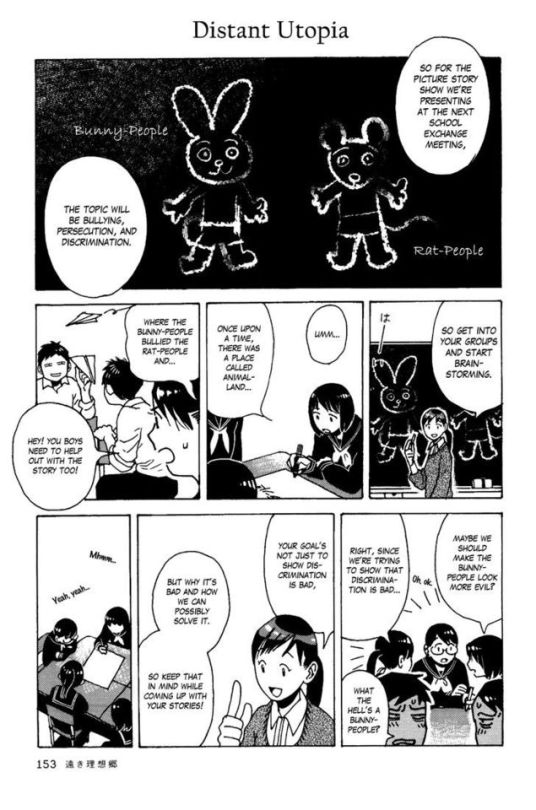
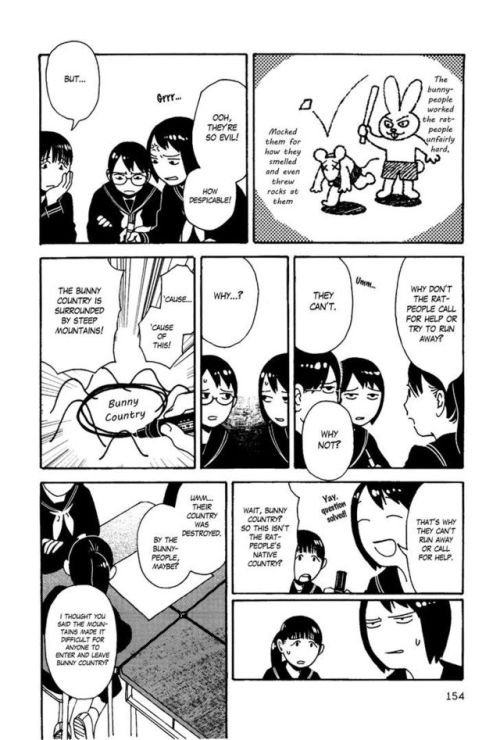
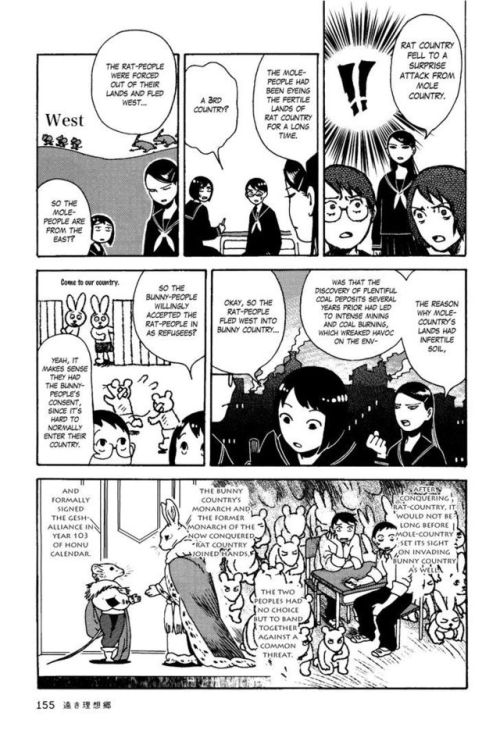
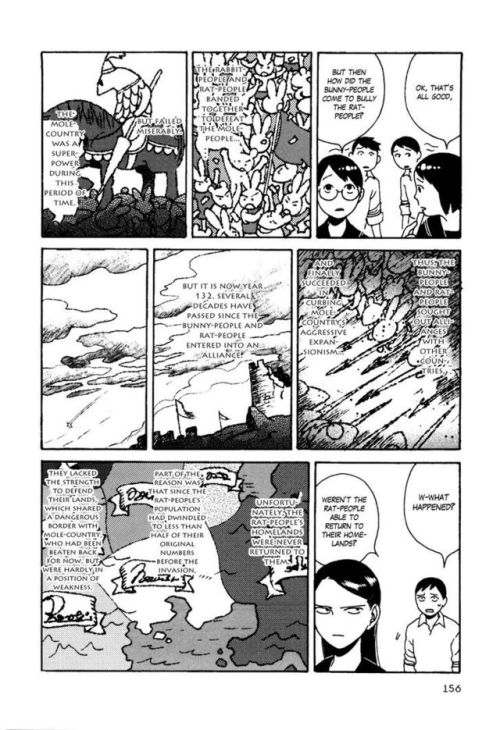

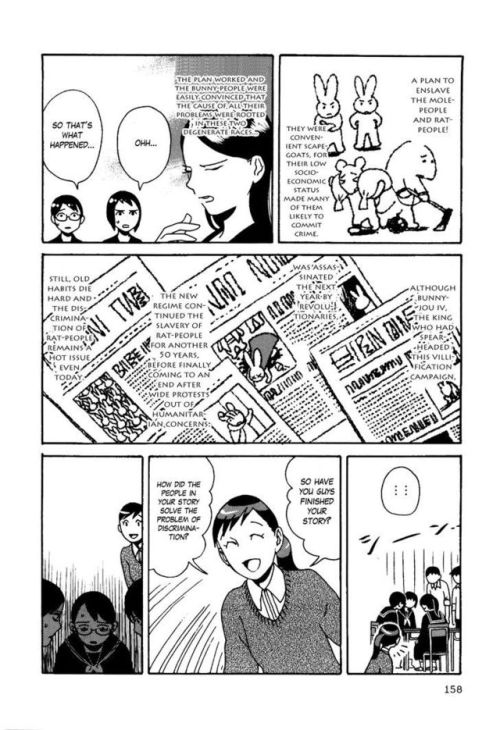
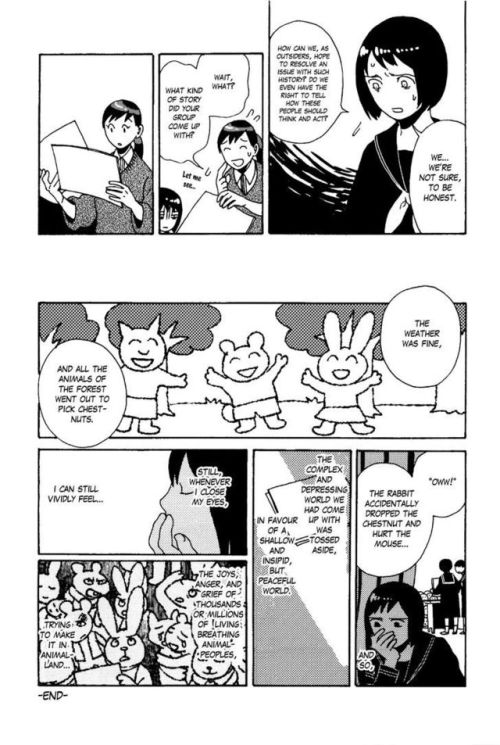
Distant Utopia - from ひきだしにテラリウム (Terrarium in a Drawer) by Ryoko Kui
now that Dungeon Meshi has an official English translation, i hope someday Kui’s other work will get translated too. this anthology was really good, and this story was one of my favorites
Someone on Reddit made the mistake of saying, "Teach me how this conflict came about" where I could see it.
Let me teach you too.
The common perception is that Jews came out of nowhere, stole Palestinian homes and kicked Palestinians out of them, and then bombed them for 75 years, until they finally rebelled in the form of Hamas invading Israel and massacring 22 towns in one day.
The historical reality is that Jews have lived there continuously for at least 3500 years.
There are areas, like Meggido iirc, with archeological evidence of continuous habitation for 7,000 years, but Jewish culture as we recognize it today didn't develop until probably halfway through that.
Ethnic Jews are the indigenous people of this area.
Indigeneity means a group was originally there, before any colonization happened, and that it has retained a cultural connection to the land. History plus culture.
That's what Jews have: even when the diaspora became larger than the number of Jews in Israel, the yearning to return to that homeland was a daily part of Jewish prayer and ritual.
The Jewish community in Israel was crushed pretty violently by the Roman Empire in 135 CE, but it was still substantial, sometimes even the majority population there, for almost a thousand years.
The 600s CE brought the advent of Islam and the Arab Empire, expanding out from Saudi Arabia into Israel and beyond. It was largely a region where Jews were second-class citizens. But it was still WAY better than the way Christian Europe treated Jews.
From the 700s-900s, the area saw repeated civil wars, plagues, and earthquakes.
Then the Crusades came, with waves of Christians making "pilgrimages to the Holy Land" and trying to conquer it from Muslims and Jews, who they slaughtered and enslaved.
Israel became pretty well depopulated after all that. It was a very rough time to live there. (And for the curious, I'm calling it Israel because that's what it had been for centuries, until the Romans erased the name and the country.)
By the 1800s, the TOTAL population of what's now Israel and Palestine had varied from 150,000 - 275,000 for centuries. It was very rural, very sparsely populated, on top of being mostly desert.
In the 1880s, Jews started buying land and moving back to their indigenous homeland. As tends to happen, immigration brought new projects and opportunities, which led to more immigration - not only from Jews, but from the Arab world as well.
Unfortunately, there was an antisemitic minority spearheaded by Amin al-Husseini. Who was very well-connected, rich, and from a politically powerful family.
Al-Husseini had enthusiastically participated in the Armenian Genocide under the Ottoman Empire. Then the Empire fell in World War One, and the League of Nations had to figure out what to do with its land.
Mostly, if an area was essentially operating as a country (e.g. Turkey), the League of Nations let it be one. In areas that weren't ready for self-rule, it appointed France or Britain to help them get there.
In recognition of the increased Jewish population in their traditional, indigenous homeland, it declared that that homeland would again become Israel.
As in, the region was casually called Palestine because that was the lay term for "the Holy Land." It had not been a country since Israel was stamped out; only a region of a series of different empires. And the Mandate For Palestine said it was establishing "a national home of the Jewish people" there, in recognition of "the historical connection of the Jewish people with Palestine and to the grounds for reconstituting their national home in that country."
Britain was appointed to help the Arab and Jewish communities there develop systems of self-government, and then to work together to govern the region overall.
At least, that was the plan.
Al-Husseini, who was deeply antisemitic, did not like this plan.
And, extra-unfortunately, the British response to al-Husseini inciting violent anti-Jewish riots was to put him in a leadership role over Arab Palestine.
They thought it would calm him down and perhaps satisfy him.
They were very wrong.

He went on to become a huge Hitler fanboy, and then a Nazi war criminal. He co-created the Muslim Brotherhood - which Hamas is part of - with fellow fascist fanboy Hassan al-Banna.

He got Nazi Party funding for armed Muslim Brotherhood militias to attack Jews and the Brits in the late 30s, convincing Britain to agree to limit Jewish immigration at the time when it was most desperately needed.
He started using the militias again in 1947, when the United Nations voted to divide the mandated land into a Jewish homeland and a Palestinian one.
Al-Husseini wouldn't stand for a two-state solution. He was determined to tolerate no more than the subdued, small Jewish minority of second-class citizens that he remembered from his childhood.
As armed militias increasingly ran riot, the Arab middle and upper classes increasingly left. About 100,000 left the country before May 1948, when Britain was to pull out, leaving Israel and Palestine to declare their independence.
The surrounding nations didn't want war. They largely accepted the two-state solution.
But al-Husseini lobbied HARD. And by mobilizing the Muslim Brotherhood to provide "destabilizing mass demonstrations and a murderous campaign of intimidation," he got the Arab League nations to agree to invade, en masse, as soon as Britain left.


About 600,000 Arabs fled to those countries during the ensuing war.
Jews couldn't seek refuge there; in fact, most of those countries either exiled their Jews directly, confiscating their property first, or else made Jewish life unlivable and exploited them for underpaid or slave labor for years first.

By the time the smoke cleared and a peace treaty was signed, most of the Arab Palestinian community had fled; there was no Arab Palestinian leadership; many of the refugees' homes and businesses had left had been destroyed in the war; and Israel had been flooded with nearly a million refugees from the Arab League countries and the Holocaust - even more people than had fled the war.
That was the Nakba. The one that gets portrayed as "750,000 Palestinians fled or were expelled!" in the hope that you'll assume they were expelled en masse, their beautiful intact homes all stolen.
Egypt had taken what's now the Gaza Strip in that war, and Jordan took what's now the West Bank - expelling or killing all the Jews in it first.
(Ironically, Jordan was originally supposed to be part of Israel. Britain, inexplicably, cut off what would have been 75% of its land to create Jordan.

Even more inexplicably, nobody ever talks about it. I've never seen anyone complain that Jordan was stolen from Palestinians. Possibly because Jordan is also the only country that gave Palestinian refugees full citizenship, and it's about half Palestinian now.
Israel is nearly 25% Arab Palestinians with full citizenship and equal rights, so it's not all that different -- but the fundamental difference of living in a country where the majority is Jewish, not Muslim, probably runs pretty deep.)
Anyway: that's why Palestine is Gaza and the West Bank, rather than being some contiguous chunk of land. Or being the land set aside by the U.N. in 1947.
Because Arab countries took that land in 1948, and treated them as essentially separate for 20 years.
Israel got them back, along with the Golan Heights and the Sinai Peninsula, in the next war: 1967, when Egypt committed an act of war by taking control of the waterways and barring Israel from them. It gave the Sinai back to Egypt as part of the 1979 peace accords between Egypt and Israel.
Israel tried to give back the Gaza Strip at the same time. Egypt refused.
Palestine finally declared independence in 1988.
But Hamas formed at about the same time. Probably in response, in fact. Hamas is fundamentally opposed to peace negotiations with Israel.
Again: Hamas is part of a group founded by Nazis.
Hamas has its own charter. It explains that Jews are "the enemy," because they control the drug trade, have been behind every major war, control the media, control the United Nations, etc. Basic Nazi rhetoric.
It has gotten adept at masking that rhetoric for the West. But to friendlier audiences, its leaders have consistently said things like, "People of Jerusalem, we want you to cut off the heads of the Jews with knives. With your hand, cut their artery from here. A knife costs five shekels. Buy a knife, sharpen it, put it there, and just cut off [their heads]. It costs just five shekels."

(Palestinians were outraged by this speech. Palestinians, by and large, absolutely loathe Hamas.

It's just that it's not the same to say that to locals, as it is to say it where major global powers who oppose this crap can hear you.)
Hamas has stated from the beginning that its mission is to violently destroy Israel and take over the land.
It has received $100M in military funding annually, from Iran, for several years. Because Iran has been building a network of fascist, antisemitic groups across the Middle East, in a blatant attempt to control more and more of it: Hezbollah in Lebanon. The Houthis in Yemen.
Iran has been run by a very far-right, deeply antisemitic dictatorship for decades now, which pretty openly wants to take down both Israel and the U.S.
Last year, Iran increased Hamas's funding to $350M.
The "proof of concept" invasion of Israel that Hamas pulled off on October 7th more than justifies a much bigger investment.
Hamas has publicly stated its intention to attack "again and again and again," until Israel has been violently destroyed.
That is how this conflict came about.
A Nazi group seized power in Gaza in 2007 by violently kicking the Palestinian government out, and began running it as a dictatorship, using it to build money and power in preparations for exactly this.
And people find it shockingly easy to believe its own hype about being "the Palestinian resistance."
As well as its propaganda that Israel is not actually targeting Hamas: it's just using a literal Nazi invasion and massacre as an excuse to randomly commit genocide of the fraction of Palestine it physically left 20 years ago.
Despite the fact that Palestinians in Gaza have been protesting HAMAS throughout the war.

How Much World Building is Too Much?
Anonymous asked: This question is on behalf of my cousin who came to me for advice. When he has an idea, he writes the most detailed worldbuilding EVER, designs the characters and has a general idea of how the story will go, but then when he starts writing he does maybe 2 chapters and it dies. I, on the other hand, do ZERO worldbuilding ahead of time (I don't need much) and end up finishing 80% of what I start out to write. How do you know how much worldbuilding is enough? How do you keep from spending so much time planning that by the time you get to writing, you don't know where you're going with the actual story? I want to help him but our styles are so different, I don't know where to start.💔
(Ask edited for length...)
I identify with your cousin a lot, because this is often how my stories go. I'm first inspired by a place, or the idea of a place, and everything sort of grows out from there. In my early days, I would also pour everything into world building and character creation, only to find myself falling flat with the story. And a big part of that, I learned, was that I didn't really understand how stories worked. It was easy to build a world and set up characters, but since I didn't understand story structure, I didn't understand how to flesh out the nugget of a story idea I had to go with that setting.
So, one thing you might do is try to get a feel for where your cousin is in that respect. You can start by asking pointed questions about the potential plot, and if he doesn't have answers already, it will help guide him in that direction. Some questions I would ask:
1 - Who is your protagonist? What is their "normal world" life like before things are turned upside down with the inciting incident?
2 - Who and what is important to your protagonist? (Stakes)
3 - What past experiences have led to them being who they are now?
4 - What needs to change about your protagonist's life, beliefs, or values?
5 - What happens to turn your protagonist's world upside down? (Inciting incident) Who (or what) causes this to happen? (Antagonistic force)
6 - How does this affect your protagonist specifically, and what goal do they decide to pursue in order to resolve the problem?
7 - What steps does your protagonist plan to take in order to reach their goal? What knowledge, skills, resources, or help must they acquire in order to achieve their goal?
8 - What obstacles does the antagonistic force create that the protagonist must overcome on their way to the goal?
9 - How do the events of the story help to change your protagonist's life circumstances, beliefs, or values for better or worse? How will they change by the end of the story?
10 - How does your protagonist face off against the antagonistic force, attempting to defeat them once and for all in order to reach their goal? Are they successful? What is the aftermath and how is the character's world/life changed--for better or worse--as a result of these events?
If your cousin can answer these questions, they'll have a reasonably well fleshed out plot that should help carry them through the story. How little or much planning of the plot ahead of time they need is something they'll need to discover over time, but if the above isn't enough to help them get through the story, they might want to go back and flesh out the specific plot points. You can point them in the direction of my post Creating a Detailed Story Outline, which suggest several different story structure templates they can look at to help them coax out the specific plot points of their story. And, bear in mind that story structure templates do not have to be followed exactly. They're just a guide to help you flesh out the story. Many writers like to combine different elements of different plot structures as a loose guide as they write their stories.
I hope this helps!
•••••••••••••••••••••••••••••••••
I’ve been writing seriously for over 30 years and love to share what I’ve learned. Have a writing question? My inbox is always open!
LEARN MORE about WQA
SEE MY ask policies
VISIT MY Master List of Top Posts
COFFEE & COMMISSIONS ko-fi.com/wqa
on the topic of not using AI for research, also be aware of using automatic Google results because they rely on AI too and don't ACTUALLY know what they're talking about
case in point: oh let's Google what flowers are safe for cats!
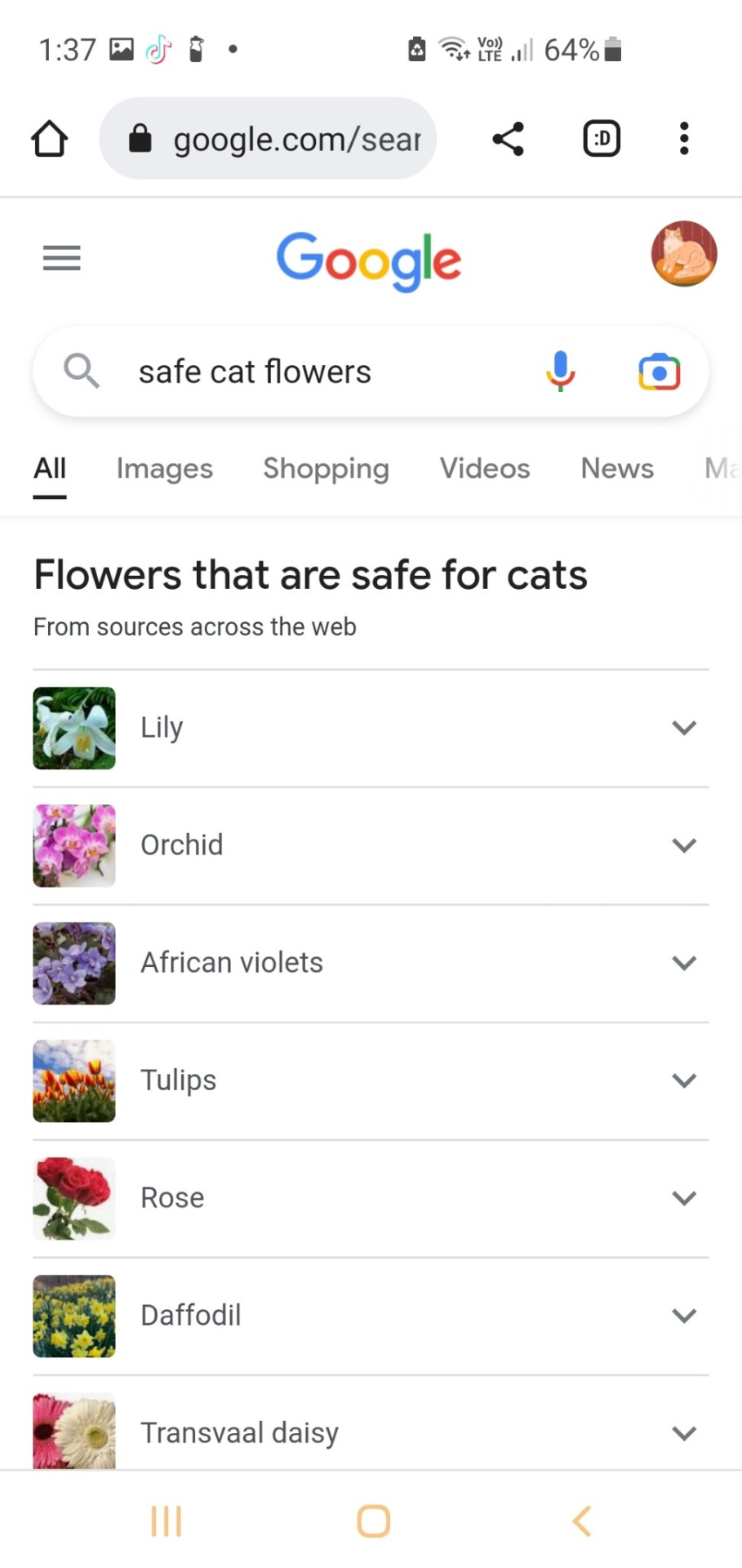
Google: lilies! source? trust me bro
Lilies?
You mean perhaps the most poisonous plant for cats there is? that can cause sudden Organ Shut Down and Death? Thanks Google! Good thing I can rely on your handy suggestions so I don't have to click on any actual websites and read to make sure your information is correct! (Also tulips and daffodils will also definitely Smite your cat but I'm not sure about the other flowers)
remember just because Google or an AI is telling you something confidently doesn't mean it actually knows what it's talking about
I trust no seasoned writer or researcher does this but this is more a message to newer or younger writers or anyone with less experience with Google and how it works
-
 rosehen96 reblogged this · 2 weeks ago
rosehen96 reblogged this · 2 weeks ago -
 rosehen96 liked this · 2 weeks ago
rosehen96 liked this · 2 weeks ago -
 payeehay reblogged this · 8 years ago
payeehay reblogged this · 8 years ago -
 payeehay liked this · 8 years ago
payeehay liked this · 8 years ago -
 sneerios liked this · 8 years ago
sneerios liked this · 8 years ago -
 theprospitianguards liked this · 8 years ago
theprospitianguards liked this · 8 years ago -
 the-redbaron liked this · 8 years ago
the-redbaron liked this · 8 years ago -
 elitigre liked this · 8 years ago
elitigre liked this · 8 years ago -
 mothfishing reblogged this · 8 years ago
mothfishing reblogged this · 8 years ago
Hello, this blog is for posting things I find interesting like critical opinions about media and fanarts. PS: NO spicy fanart on this blog
126 posts




